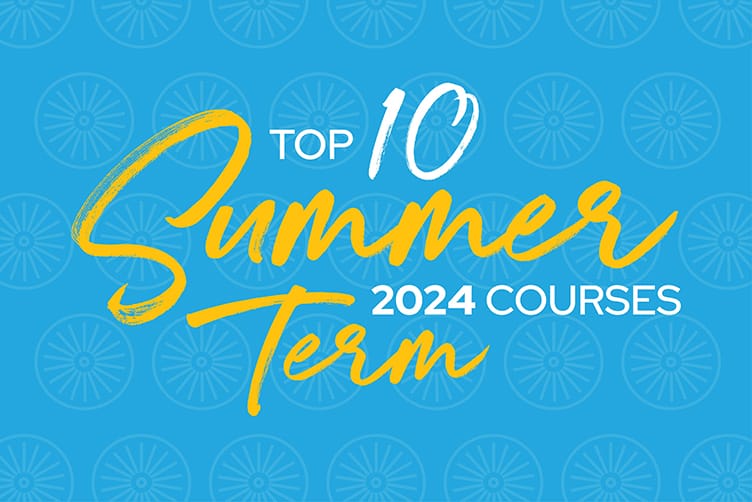

Top 10 Summer Term courses, from chemistry to retailing
Summer Term may be winding down, but Badgers stayed busy this summer with a wide range of in-person and online courses.
This year’s list of the top 10 undergraduate summer courses included courses in five UW–Madison Schools and Colleges, covering topics ranging from media studies to retailing and microeconomics to organic chemistry. More than 1,600 students enrolled in these 10 courses alone, in learning modes including lectures, discussion groups, internships and labs.
Are you ready to see the top 10 Summer Term courses for 2024? Let’s count them down.
10) CHEM 344: Introductory Organic Chemistry Lab. Introduces students to organic chemistry’s basic synthesis, purification and characterization techniques, along with critical interpretation of experimental data. Covers material from CHEM 343 and CHEM 345 lecture courses.
9) ECON 101: Principles of Microeconomics. Offers students a solid understanding of how economic forces shape almost every aspect of their lives. Topics include economic problems of individuals, firms and industries, with an emphasis on value, price and distribution of income.
8) STAT 371: Introductory Applied Statistics for the Life Sciences. Provides an introduction to modern statistical practice in the life sciences. Topics include exploratory data analysis, probability and random variables; one-sample testing and confidence intervals, role of assumptions, sample size determination and two-sample inference; basic ideas in experimental design, analysis of variance, linear regression and goodness-of fit; and biological applications.
7) STAT 324: Introductory Applied Statistics for Engineers. Introduces descriptive statistics, probability concepts and distributions, and random variables. Students learn hypothesis tests and confidence intervals for one- and two-sample problems as well as linear regression, model checking and inference. Teaches analysis of variance and basic ideas in experimental design.
6) COMM ARTS 313: Topics in Film and Media Studies. Explores various topics in film and media studies, history and theory. Students analyze film and media texts, institutions or audiences from theoretical, historical and critical perspectives appropriate to the topic. Topics for this summer’s two sections examined horror and crime films.
5 – Tie) PSYCH 210: Basic Statistics for Psychology. Challenges students to think critically and apply quantitative skills to develop models, interpret data, draw conclusions and solve problems within a disciplinary or interdisciplinary context. Students learn measures of central tendency, variability; probability, sampling distributions; hypothesis testing, confidence intervals; t-tests; Chi-square; regression and correlation (linear) and introduction to analysis of variance (1-way).
5 – Tie) L I S 461: Data and Algorithms: Ethics and Policy. An introduction to ethical, legal and policy issues related to analytics, “big data” and algorithms to support decision-making. Gain familiarity with major debates and controversies in a variety of contexts. Critically analyze course materials and apply moral reasoning and legal concepts to assess case studies and critique arguments made by others.
3) BIOCHEM 501: Introduction to Biochemistry. Introduces the chemistry, nutrition and metabolism of biological systems. Among the learning outcomes, students learn to describe how biomolecules store, transmit, and receive information to carry out cellular functions and explain how molecular interactions drive the formation of macromolecular structure.
2) INTEREGR 397: Engineering Communication. Communication for engineering, science and technology; theory and practice in planning, preparing and critiquing reports, proposals and workplace correspondence; persuasive argumentation, ethical decision-making strategies, multidisciplinary communication skills, research strategies and collaborative work.
And earning the top spot for Summer Term 2024 courses:
1) CNSR SCI 603: Retailing Internship. Enables students with supervised internships to earn academic credit while engaging in professional experience in retailing fields. The course is intended for juniors and seniors in retailing and consumer behavior.
With more than a thousand courses — hundreds of them online — Summer Term is here to help you stay on track for graduation and make progress toward your academic goals.
Still savoring a little more summer? Don’t put the sunscreen and sandals away quite yet. There are still a few weeks left to enjoy all the summer has to offer.
See you in Summer Term 2025!
Learn more about UW–Madison Summer Term. Last chance to share your Summer Term story. Tag @uwsummer and #MyBadgerSummer on Instagram and show us what you’ve been up to.
Published on Aug 05 2024
Last Updated on May 29 2025
Categories: News, Summer Term
Tags: bachelor's degree, courses
Previous Post
Conquering chemistry in the summer
